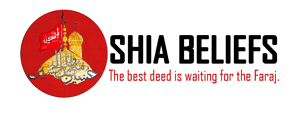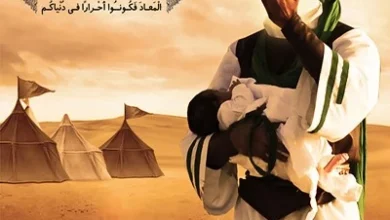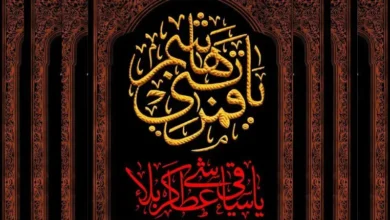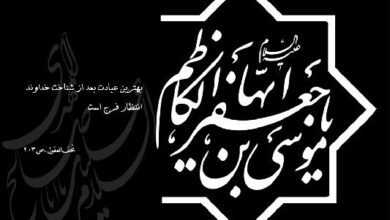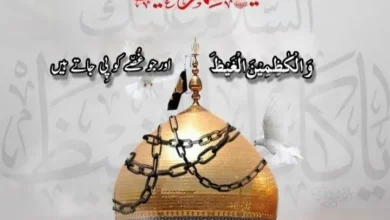Who Is Hazrat Abbas (as)?
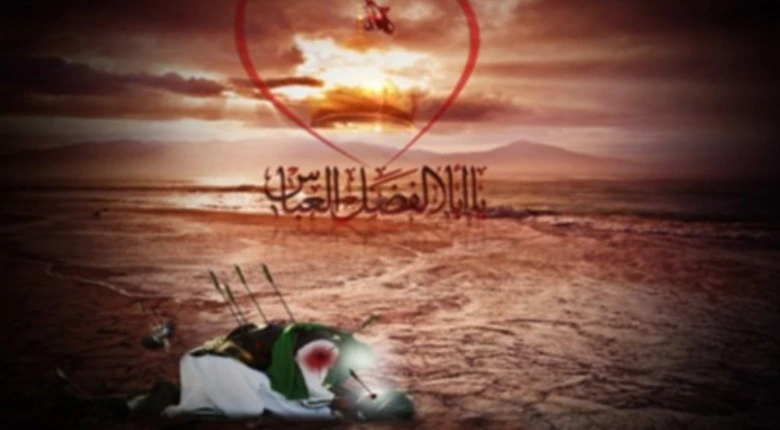
Hazrat Abbas ibn Ali (as) was the son of Imam Ali ibn Abu Talib and Hazrat Ummul Baneen, Fatima binte Hizam. Shi’a Muslims hold Hazrat Abbas (as) in high regard for his devotion to His brother and third Shi’a Imam, Hussain ibn Ali (as), His regard for the Ahle Bayt, and his involvement in the Battle of Karbala. Hazrat Lubaba binte Obaidullah ibn Abbas ibn Abdul Muttalib was Hazrat Abbas’ wife.
Fazal ibn Abbas, Qasim ibn Abbas, and Obaidullah ibn Abbas were his three sons. During the Battle of Karbala, two of them were slain. Obaidullah ibn Abbas succeeded Hazrat Abbas ibn Ali’s familial lineage. Hazrat Obaidullah has five sons after that. Abdullah ibn Obaidullah, Abbas ibn Obaidullah, Hamza ibn Obaidullah, Ibrahim ibn Obaidullah, and Fazal ibn Obaidullah were the names of Hazrat Abbas ibn Ali’s grandchildren.
The Angel Gabriel is said to have told the Holy Prophet Hazrat Muhammad (pbuh) what would happen to his grandson Hazrat Imam Hussain ibn Ali (as) at Karbala. This devastated Hazrat Muhammad (pbuh) and Hazart Fatima Zahra (sa), and Imam Ali (as), thus Imam Ali longed for a son to assist Hussain ibn Ali (as) in Karbala. He directed his brother, Aqeel ibn Abu Talib, to look for a woman of brave heritage. Aqeel mentioned Fatimah Kelabiya, also known as Ummal Baneen, who descended from the illustrious lineage of Hezam ibn Khalid ibn Rabi’e ibn Amer Kalbi. During the lifetime of Fatima Zahra, Ali ibn Abu Talib did not marry Ummal Baneen (or any other lady).
Childhood Of Moula Abbas (as)
Hazrat Abbas ibn Ali ibn Abu Talib (as) was born on the 4th of Shaban, 26th of Hijra (AH). He was Ali ibn Abu Talib’s and Fatimah bint Hizam’s son. Abdullah ibn Ali, Jafar ibn Ali, and Usman ibn Ali were Abbas’ three brothers. Abbas was 34 years old when He was martyored. He is claimed to have not opened his eyes after birth until His brother Hussain ibn Ali (as) carried Him into His arms. Hazrat Abbas (as) learnt to fight from His great father Imam Ali (as), the most fearsome fighter of all time.
Hzarat Abbas (as) never believed himself to be on the same level as His brothers Imam Hassan and Imam Hussain (as) in terms of position or grandeur. Hazrat Abbas (as), on the other hand, saw His brother Hussain (as) His master. Except for himself, Abbas disliked everyone who worked for Imam Hussain (as).
The following occurrence exemplifies this devotion: Imam Ali ibn Abu Talib (as), Imam Hussain (as), Qanbar (Ali’s friend), and Hazrat Abbas were seated in the Kufa Mosque. Imam Hussain (as) requested that Qanbar bring him water since He was thirsty.
“I will fetch the water for my lord personally,” Abbas remarked, coming to a halt. Abbas was a young man at the time.
The Beauty of Face and Character of Hazrat Abbas as
Human nature is drawn to beauty. Humans have a natural affinity to beauty, and an appreciation for beauty is entwined with their nature. Beauty may be classified into two categories: outward beauty and interior beauty/morality. Man considers complete and total beauty to be a blend of exterior (appearance) and inherent (soul) beauty. Although natural beauty and adornments enhance one’s look, education and morality preserve man’s inner beauty, providing him with spiritual attractiveness.
According to historical records, Hazrat Abbas ibn Ali (as) was the most beautiful young man with apparent attractiveness. His face had the shine of the moon like His father Imam Ali (as), and He was known as the Qamar e Bani Hashem”Moon of Bani Hashem” among the Bani Hashem, who were all noted for their beauty (Manaqib Ibn Shahr Ashoob, vol. 4, p. 108).
He was gracefully tall and powerful. His feet would touch the ground when He sat on a horse When he stepped upon the horse pedal, his knee would line the horse’s ears. (Maqatil al-Taalebin, p. 90 – Bihar al-Anwaar, vol. 45, p. 39).
However, one should not be satisfied with His exterior beauty because His qualities constructed the remainder of Abbas ibn Ali’s (A.S) attractiveness. He was lovely in both spirit and character. On the one hand, He was a man of devotion, faith, and conviction, and He was regarded as one of the greatest heroes of Islam. He was also quite knowledgeable.
Hazrat Abbas ibn Ali (A.S) maintained His faith in Allah. He possessed a sharp mind and a firm conviction. His heart was filled with monotheism and Allah’s love. Sheikh Saduq described the prostration markings on his forehead (Thawaab al-‘Amaal wa Iqaab al-‘Amaal, p. 219). He was used to midnight prayers, and His visage reflected his adoration and total humility before Allah.
Hazrat Abbas ibn Ali (A.S) was remarkable in both ceremonial devotion and combat. He possessed His father’s fearlessness. These two characteristics are seldom encountered in the same person. Abbas (A.S) had committed Himself to the path of the infallible Imams (A.S) with courage and dedication to truth. His bravery and loyalty were so well known that Shia Imams often lauded him as a man of exceptional integrity and morals.
Imam Sajjad (A.S) sobbed one day when He saw “Ubaidallah,” the son of Hazrat Abbas ibn Ali… “May Allah bless my uncle Abbas who sacrificed Himself for the cause of His brother and committed His life,” Imam stated in memory of Hazrat Abbas (A.S). He sacrificed so that both of His hands were severed. In lieu of the two severed hands, Allah bestowed Him with two wings in paradise, allowing him to soar with the angels, as Ja’far ibn Abi Talib did.”
Hazrat Abbas ibn Ali’s (A.S) bravery has earned Him a high reputation, as Imam Sajjad (A.S) explains: “Abbas has such a high rank with Allah that all martyrs will envy him on the Day of Judgement.”Amali Sheikh Saduq (Amali Sheikh Saduq, p. 432).
He was not only a brave and Holy Person, but His depth of knowledge benefitted from His father’s wellspring of information since boyhood. Some narrations use the phrase “He has thoroughly tasted the information” to refer to knowledge He obtained at a young age.
His level of jurisprudence was exceptionally high, and He was one of the most trusted narrators of his day. According to certain experts, Hazrat “Abbas (A.S) was among the educated scholars of the Imams’ offspring who was just, trustworthy, and devout.” (Tanqih al-Maqaal, vol. 2, p. 128) or “Abbas (A.S) was one of Ahl al-Bait’s (A.S) intellectuals and academics.” (Qayeni has used this title for Abbas ibn Ali).
What was described was merely a small portion of Abbas’ (A.S.) moral qualities. In a nutshell, he possessed both beauty and character. These wonderful attributes have distinguished and immortalised Abbas ibn Ali (A.S) throughout Islamic history.
Courage in Abbas Bin Ali
What exactly is courage? In Islamic ethics, bravery is described as having control over one’s emotions and sentiments and using them solely for the sake of the purpose. A person who depends solely on his physical strength and is unable to manage his emotions is not courageous; rather, he is foolish.
“Muhammad, the Messenger of Allah, and those who are with him are hard against the adversaries yet gentle with their own,” Allah says of the Prophet and his genuine followers. (48:29)
In his literary manner, Iqbal, the famed poet of the Indian subcontinent, offers the same concept:
The believer is as strong as steel in the quest for truth.
But when he’s around his buddies, he’s as soft as silk.
Hazrat Abbas (as) was not a slave to his appetites and emotions; even his courage was tied to the spiritual relationship: Hazrat Abbas (as) was tough and forceful when confronting opponents, yet he was gentle, empathetic, and loving towards good people. Hussain’s children and the Banu Hashim tribe idolized him. He was Sakina, Imam Hussain’s four-year-old daughter,’s favourite uncle.
When Imam Hussain instructed Hazrat Abbas (as) to provide water for the children, He attacked the opposing army and quickly dispersed them, gaining access to the river. Hazrat Abbas (as) waded into the river and filled the water-bag. On the way back, He had to walk through some palm trees, and the adversary was lurking behind the trees, ready to attack him from behind. One Yazidi soldier assaulted him from behind, causing him to lose his right hand. Abbas bravely grabbed the water-bag and consoled himself with the following verses:
Even if you have cut my right hand, by God,
My religion, I will always protect it.
I will stand up for the sincere leader of conviction.
The Prophet’s clean and truthful grandson.
The Standard Bearer of Karbala
Hazrat Abbas (A.S) could no longer bear life after seeing His companions and family killed and the Hujjah of his time suffering from the large number of enemies surrounding him after his supply route was cut off and hearing the women wailing and the children crying of thirst. He requested permission from His brother Imam Hussain (as). The sacred soul of the Father of the Oppressed did not accept to part with Abbas (A.S), the most precious asset to the grandson of the Prophet (P.B.U.H), who was soon to be martyred, especially since the foes always dreaded having to fight him and feared his advance and how the ladies felt secure seeing the standard raised high.
“O brother!” exclaimed the Imam (A.S). You’re my standard! Abbas (A.S) stated, “I am fed-up with these hypocrites, and I want to pursue revenge.” Hussain (A.S) instructed him to provide water for the children, so Abbas went to them and warned them of the Omnipotent’s wrath, but they ignored him.
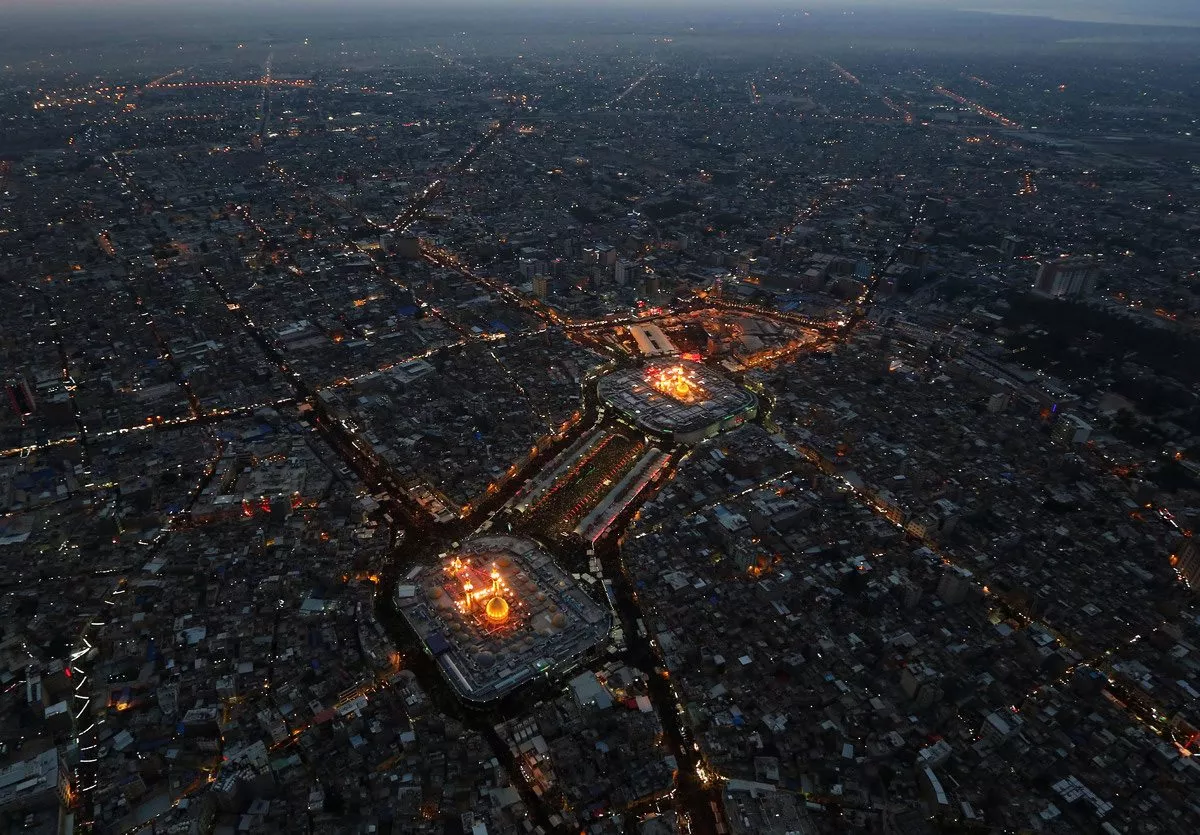
“O Umar ibn Sa’ad!” he yelled. Hussain, son of the Messenger of Allah’s daughter! You slaughtered His friends and family, and now His kids are thirsty! thirst has burned their hearts!” Some enemy soldiers were affected by those pleadings and sobbed, but Shimr yelled, “O son of Abu Turab! Had the world been covered with water and in our hands, we would not have given you a drop to drink unless you swore loyalty to Yazid!”
Hazrat Abbas (as) informed His brother about his conversations with the thugs. Hazrat Abbas (as) could no longer stand it when He heard the kids begging for water. His Hashemite ardour was strong.
He mounted His horse and took the water bag. Four thousand archers encircled Him and shot Him, but He persisted. He chased those crowds alone as His standard flew above. They couldn’t determine if Abbas was killing their heroes. He entered the Euphrates River despite the mob since their soldiers could not hold their ground.
After having one handful of water in His hand, He realized how thirsty Hussain (A.S) and others were, so He spilt it and said:
O soul! No one counts after Hussain!
You should do nothing after him,
Hussain nears death.
While drinking chilly water?!
By Allah! A deed is not this.
All my creed requires!
He filled the water bag, mounted His horse, and headed to camp. He kept slaying those blocking his route until he could get through, as he said:
I don’t dread death when it calls,
Till you bury me in swords.
My soul guards one
The Prophet’s grandson?
I carry a water bag, Abbas.
I face evil without fear!
Zayd ibn Arqam and Ibn Tufail ambushed him behind a palm tree and cut off his right arm with a sword. Hazrat Abbas (as) said
By Allah! If you chop my right hand,
I’ll keep defending my faith,
I defend an Imam committed to his faith.
Son of the trustworthy Prophet Allah sent.
He didn’t care that His right hand was chopped off since He was focused on providing water to Hussain’s children and family, but Ibn Tufail was still concealing another palm tree as he went by. Hakim hit him with his sword, amputating his left hand, and several men surrounded him. Arrows raining on Him pierced the water bag and bore a hole through it, spilling its water. The arrow penetrated His chest. A pole hit His skull, seriously wounding Him left dividing His head into two parts.
He collapsed, saying, “Peace unto you from me, O father of Abdullah!” A.S. Hussain ran to him.
I want to know if he went to him with a soul threatened by this huge loss or by the fraternity that binds a brother to his loving sibling. Yes, Hussain (A.S) approached Him and saw the Holy One being sacrificed on a bloody field adorned with arrows. Abbas neither possessed power nor words to deter His enemies. His head was bleeding and He couldn’t see.
Has Hussain (A.S) seen all these disasters and still had the strength to stand? Only Hussain remained following Abbas’s death. Without life’s essentials, He stared at the sky. A.S. best summarised his condition: “Now my spine has been fractured and my endeavour is more weakened.”
He left him where He fell for a secret reason that was revealed later:
He was to be buried separately from the other martyrs so that he would have a mausoleum of his own to be visited by those who seek His intercession with the Almighty to grant them their wishes and so that his grave site would be a place for worshipping the Almighty, Praise to Him, under its dome that glows in the sky. There, spectacular miracles reveal his high standing with Allah Almighty to the nation. It then fulfils its love responsibility by visiting him. Greeting him connects them to Allah, the Most Exalted.
Imam Hussain (A.S) returned to camp sad and crying. He continued wiping his eyes with his cuffs as men hurried to attack his camp. “Is there anyone who can assist us?! Anyone who provides security? Is there anyone who wants justice and supports us?! Is anyone who fears the Fire and defends us?
He informed her he was killed. Hazrat Zainab (sa) shouted,
“O brother!” after hearing his tragic news. O Abbas! The loss of you! Hussain (A.S) and women cried, saying, “O our loss after you!”
